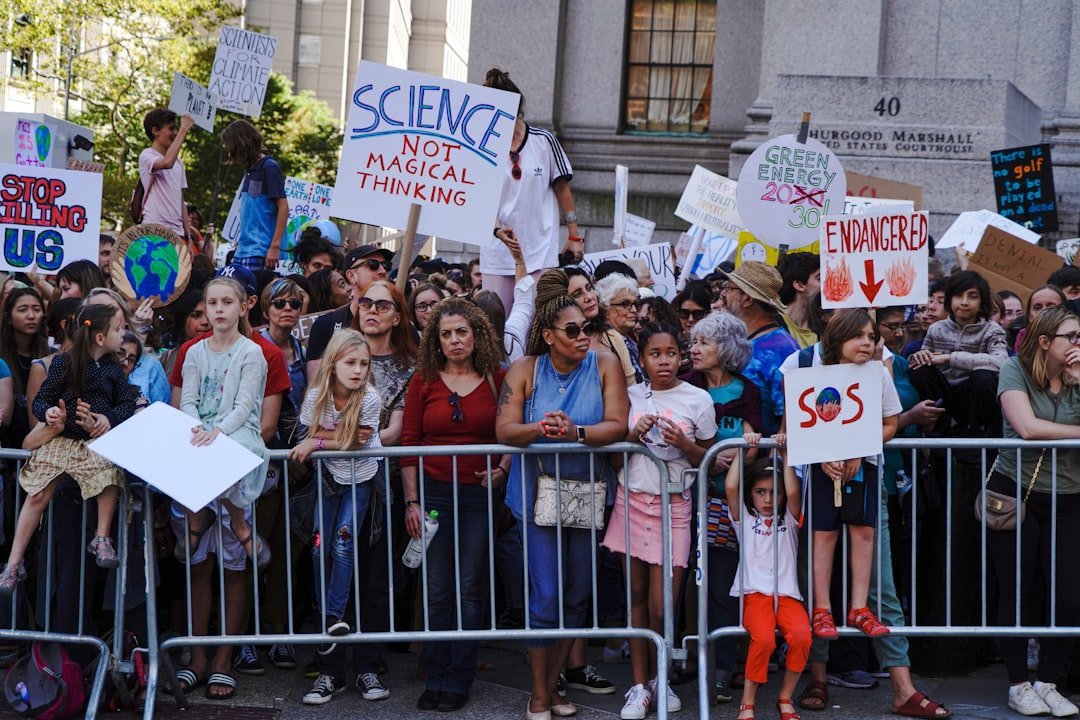Global Climate Action’s Importance COP16 The sixteenth Conference of the Parties (COP16) to the United Nations Framework Convention on Climate Change (UNFCCC) was held in Cancun, Mexico, from November 29 to December 10, 2010. Government officials, environmental activists, and scientists from almost 200 nations came together for this historic meeting with the shared objective of tackling the urgent problem of climate change. The contentious COP15 in Copenhagen in 2009, which concluded without a legally binding agreement, was followed by COP16.
Key Takeaways
- COP16, or the 16th Conference of the Parties to the United Nations Framework Convention on Climate Change, aimed to address global climate change issues.
- COP16 was important in addressing climate change as it brought together countries to negotiate and make decisions on reducing greenhouse gas emissions and adapting to the impacts of climate change.
- International cooperation played a crucial role in COP16, as countries worked together to reach agreements and make commitments to combat climate change.
- Key agreements and decisions made at COP16 included the establishment of the Green Climate Fund and the Cancun Agreements, which set out a framework for future climate action.
- COP16 had a significant impact on global climate action by setting the stage for future negotiations and commitments to reduce emissions and support vulnerable countries.
The COP16 conference was therefore viewed as a chance to restore international confidence and establish the framework for upcoming climate talks. A renewed commitment to addressing climate change & a sense of urgency characterized the conference. Aiming to establish a framework that would promote global collaboration & result in tangible measures, COP16 was prompted by the scientific community’s growing warnings about the grave consequences of inaction. The occasion was marked by a number of discussions, workshops, and side events that addressed different facets of climate change, such as financing methods, adaptation plans, & mitigation techniques. The world had to prepare for the effects of climate change that were already being felt globally while simultaneously reducing greenhouse gas emissions, so the stakes were high.
In addition to its immediate effects, COP16 had a significant long-term impact on global climate policy. Countries were able to share best practices in climate adaptation and mitigation as well as reaffirm their commitments to lowering emissions during the conference. One of the major outcomes of COP16 was the Cancun Agreements, which set forth a number of nations’ voluntary pledges to reduce their greenhouse gas emissions.
The need for flexibility in addressing climate change and the complexity of global politics led to a departure from legally binding targets that had been sought in earlier negotiations. Also, COP16 emphasized how crucial it is to incorporate climate change into national development plans. Numerous nations have acknowledged that climate change is a serious threat to social cohesion and economic stability in addition to the environment. COP16 encouraged countries to embrace comprehensive strategies that take into account social justice, economic growth, & environmental preservation by addressing climate change within the framework of sustainable development.
| Metrics | Data |
|---|---|
| Number of participating countries | 194 |
| Number of observer organizations | 1,234 |
| Carbon emissions reduction target | 30% by 2030 |
| Financial commitment for climate action | 100 billion per year by 2020 |
In order to support resilience against the effects of climate change & guarantee that vulnerable groups were not left behind during the shift to a low-carbon economy, this all-encompassing viewpoint was essential. A key component of the COP16 agenda was international cooperation. In order to effectively combat climate change, which transcends national boundaries, the conference emphasized the need for nations to cooperate. Since global warming is interconnected, emissions from one region of the world can have significant repercussions in other regions.
COP16 therefore underlined the necessity of cooperative efforts to finance adaptation projects, exchange technology, & increase capacity in developing countries. In order to create an atmosphere where understanding could grow, the conference also promoted communication between developed and developing nations. Developed countries were urged to accept more accountability for their past contributions to greenhouse gas emissions while simultaneously offering developing nations, which are frequently more susceptible to the effects of climate change, financial & technical assistance.
To ensure that all parties felt included in the global response to climate change and to foster trust among nations, this cooperative spirit was crucial. The Cancun Agreements, a collection of decisions intended to strengthen global cooperation on climate change, were one of the most noteworthy results of COP16. A framework known as the Measurement, Reporting, and Verification (MRV) system was created by these agreements to track and report emissions reductions. The purpose of this system was to guarantee accountability and openness among countries with regard to their climate pledges.
Significant progress was also made at COP16 in addressing financial mechanisms for climate action. One important financial tool created to aid developing nations in their attempts to lessen the effects of and prepare for climate change is the Green Climate Fund. By 2020, this fund hoped to raise $100 billion a year from a variety of sources, including both public & private investments. To guarantee that there were funds available to assist vulnerable countries in their climate initiatives, this fund’s creation was a crucial first step.
COP16 has had a significant & lasting effect on global climate action. COP16 set the stage for later discussions and agreements by establishing a framework for voluntary commitments and financial support mechanisms. Future conferences, such as COP21 in Paris, where nations would eventually gather to create a legally binding agreement, would have a sense of direction thanks to the Cancun Agreements.
Also, COP16 assisted in increasing the understanding of the significance of climate action among a range of stakeholders, including corporations, local authorities, and civil society groups. Increased participation at all levels was sparked by the conference, which promoted creative approaches & collaborations to combat climate change. More sustainable practices in a variety of sectors resulted from the numerous nations that started integrating climate considerations into their national policies and development plans. Even with its successes, COP16 was beset by a number of issues & complaints that brought to light the difficulties involved in global climate talks. The absence of legally binding commitments from nations, especially big emitters like the US and China, was one of the main criticisms.
Numerous analysts contended that voluntary commitments were not enough to address the pressing need for significant emissions reductions. The effectiveness of the Cancun Agreements in promoting significant action was called into question by this skepticism. Concerns were also raised regarding the fairness and equity of the way that nations were assigned responsibilities. As developed nations continued to profit from the use of fossil fuels, developing nations voiced concerns that they would be unfairly burdened with tackling climate change. This conflict highlighted the necessity of constant communication and compromise to guarantee that every nation could fairly take part in international initiatives to tackle climate change.
During COP16, civil society organizations (CSOs) & non-governmental organizations (NGOs) were instrumental in pushing for more robust climate action and holding governments responsible for their pledges. By representing underrepresented communities & bringing attention to topics like social justice, human rights, and environmental sustainability, these organizations contributed a variety of viewpoints to the discussion. Their attendance at COP16 made it possible for the people most impacted by climate change to have their voices heard during the talks. During the conference, CSOs also organized workshops, hosted side events, and rallied the public in support of bold climate policies, among other activities.
Their actions promoted greater participation from people worldwide & helped to increase awareness of the urgency of addressing climate change. By encouraging communication between governments and civil society, COP16 established a welcoming atmosphere where various stakeholders could work together to find answers to one of the biggest problems facing humanity. It is crucial to consider the lessons learned from COP16 as the world moves forward and keeps accelerating climate action.
Because the conference showed that international cooperation can occur despite divergent national interests, it established a precedent for future negotiations. Significant agreements like the Paris Agreement, which was reached at COP21, were the result of the framework set at COP16, which prepared the way for later conferences. In light of growing scientific knowledge of the effects of climate change, it is imperative that countries uphold the commitments made at COP16 while simultaneously aiming for more ambitious goals. Since 2010, there has been an even greater urgency to address global warming, as more and more data indicates that failure to act quickly will have dire outcome.
Therefore, in order to put into practice practical strategies that support sustainability and resilience, governments must keep working with businesses, civil society, and local communities. To sum up, COP16 was a major turning point in international efforts to address climate change. The conference created frameworks that still direct climate action today and promoted international cooperation, despite the fact that numerous obstacles still exist. Effective responses to one of the most important issues facing humanity will be shaped by the lessons learned from COP16 as nations collaborate toward a sustainable future.
During COP16, one of the key topics discussed was combatting global warming and finding sustainable solutions for a cooler planet. This is a crucial issue that affects all aspects of our lives, including food security.
The article highlights the importance of reducing emissions to mitigate the effects of climate change and ensure a sustainable future for all. To learn more about this topic, you can read the article here.



